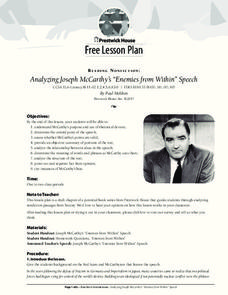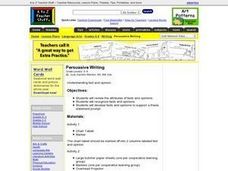Curated OER
Lesson 2: Distinguish Fact from Opinion in Books
An important part of reading informational text is being able to discern fact from opinion. The class reads chapter one from the book, Penguins by Lynn M. Stone. They analyze specific sections of the text to determine if what is being...
Curated OER
Locating Facts and Opinions in a Newspaper
Fourth graders discuss the difference between fact and opinion. In this language arts lesson, 4th graders search the newspaper and identify factual articles and opinion based articles. Students discuss what makes the article factual or...
Curated OER
The Jacket: Journal Templates Teacher's Guide
Explore this story involving prejudice and racism to enhance learners' comprehension skills. The story The Jacket by Andrew Clements involves an African American boy who is falsely accused of stealing someone's jacket. This teacher's...
Curated OER
Expressing Your Views to the Letter
Analyze the motivation, purpose, and value of letters to the editor by examining letters written in response to the violence at Columbine High School. For homework, middle and high schoolers write their own letters to the editor about an...
Curated OER
Martin Luther King Jr.: A Fact Or Opinion Activity
Students discuss the difference between fact and opinion, then read a brief biography of Martin Luther King Jr. They complete the Martin Luther King Jr.: Fact or Opinion worksheet.
Curated OER
Distinguishing Facts from Opinions
Third graders use a scavenger hunt worksheet to look through classroom books and resources and identify facts and opinions. In this fact and opinion lesson plan, 3rd graders look through non fiction and fiction books.
Curated OER
Creature Feature Poetry Keyword Search!
Learners examine the differences between fact and opinion, and brainstorm ideas for a keyword list by analyzing facts. They listen to poems, and create posters listing three keywords about each creature featured in the poetry.
Curated OER
A Way with Words
How do facts and opinions impact the news? After reading "How to Cover a War" from the New York Times, middle schoolers evaluate the claims in the article. They also consider the media's responsibilities in reporting during wartime....
Curated OER
Reading Comprehension
After listening to a story learners engage in a kinesthetic activity to answer comprehension and critical thinking questions. Finally, the students identify three main facts about the story. Extensions include a fact and opinion...
Curated OER
Fact vs. Opinion
Students explore fact versus opinion in reading material. They listen to sentences and use hand signals to identify if the sentences are facts or opinions. After reading a story, they vote on sentences for facts and opinions and stae a...
Curated OER
Fact or Opinion-Manatees
Students decipher factual information about manatees. In this biological science activity, students research characteristics about manatees. They use that information to separate facts from common opinions about the animals. Students...
Prestwick House
Reading Nonfiction: Analyzing Joseph McCarthy's "Enemies from Within" Speech
Looking for a lesson plan that teaches class members how to analyze nonfiction? Use Joseph McCarthy's famous "Enemies from Within" speech as a instructional text. Worksheet questions direct readers' attention to the many historical...
EngageNY
Identifying Author’s Opinion and Evidence: The Value of Sports in People’s Lives, Part II
Context matters! Using the intuitive resource, pupils decipher context clues to determine the meaning of unknown words from an informational text. Also, in small groups, they practice identifying the author's opinion and supporting...
Curated OER
Fact and Opinion Detectives
Third graders see how to distinguish facts from opinions in a child's news magazine. After a lecture/demo, 3rd graders utilize a sample story and a worksheet which gives them practice in distinguishing fact from opinion.
Curated OER
Persuasive Writing: Fact or Opinion
What is the difference between a fact and an opinion? Middle schoolers categorize statements as either facts or opinions before writing a persuasive essay to support a thesis statement they create. This is a great introduction to...
Curated OER
That Is Not My Opinion!
Being an informed citizen requires distinguishing fact from opinion and understanding persuasion methods. Secondary learners evaluate newspaper editorials. They read opinion pieces, identify the writer's purpose and position on an issue,...
Curated OER
Lesson 4: Fact and Opinion - Rosa Parks: My Story
Sixth graders examine implicit and explicit opinions in a text about Rosa Parks. In this explicit and implicit opinions lesson, 6th graders participate in direct teaching, guided practice, and independent practice while reading an...
Newseum
The Fundamentals of News
A short video introduces middle schoolers to different media-related news terms. Viewers then complete a worksheet and discuss the differences between news and journalism, between facts and opinions.
Curated OER
Fact V. Opinion
Students distinguish between fact and opinion when reading material. They use statements of objects to determine if they are facts or opinions.
Curated OER
Fact and Opinion
Students determine the difference between fact and opinion. They identify facts and opinions in a report. Students discuss the porportion of fact and opinion in a report. Students write a profile of the place they live and evaluate facts...
Curated OER
Form an Opinion Based on Facts
Explore fact and opinion through higher level thinking and literacy. Kids listen to the beginning of A Picture Book of Helen Keller by David A. Adler and identify facts in the text. They follow along as the teacher models how to form an...
Curated OER
Facts and Opinions in a Variety of Genres
Here is a lesson dedicated to helping learners understand the differences between facts and opinions. They examine the first page of several books from the class library to determine if the book is fact or opinion based. A Venn diagram...
Curated OER
The Buzz about Fact and Opinion
Students distinguish facts from opinions. In this biological science lesson, students research information on bees to decipher what things are proven true versus assumed. They view a video and discuss what makes the information...
Curated OER
Understanding and Using Primary and Secondary Sources in History
Explore primary and secondary sources in this historical analysis activity. Young researchers define the terms primary source and secondary source. They read a primary source document provided by the teacher and answer questions about...

























